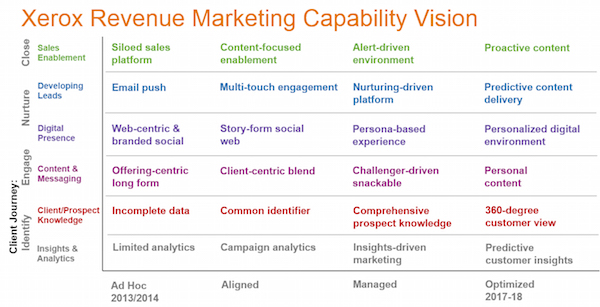In conjunction with the Connections conference this week for the Salesforce ExactTarget Marketing Cloud — which is a terrific product, but that’s a multisyllabic mouthful of a brand name — I had the privilege to do a Q&A with Woodson Martin, the CMO of that product.
We covered a range of subjects, from how Woodson manages his own marketing team to how marketers can keep up with the rapid pace of change in marketing technology.
But two topics that I found particularly interesting were their new partnership with Omnicom — as major agency holding companies and marketing software vendors increasingly entwine their destinies — and the company’s commitment to a robust ISV community around their marketing cloud platform.
Can you start with a little about your background and the path that led you to your current position?
I’ve worked in software for the last 20 years, and have held senior roles in product, marketing and operations. I’m lucky to have spent nearly a decade each at two super successful companies, Business Objects and now salesforce.com.
As the Chief Marketing Officer of the ExactTarget Marketing Cloud, I am helping to lead the fastest growing top 10 software company in the world into an amazing opportunity. We’re seeing the biggest shift in marketing ever, and it’s exciting to be a part of that.
As the chief marketer for a major marketing software company, how is your own team organized to take advantage of marketing as a technology-powered discipline? What kinds of technical roles do you have on the marketing team? How does the broader marketing team tap their capabilities?
At salesforce.com, we focus heavily on using our own technology to run not only marketing, but run the company. In the last year, we’ve doubled down on mobile with the launch of our Salesforce1 mobile app, and now we all can run our business from our phones. As a marketer, you have everything you need on your mobile device, the ability to collaborate with team members, view analytics and dashboards, and approve campaigns and creative. It allows us to be more agile.
We have also hired great mix of people with both technical and creative skills, who love the idea of making the most of the technology we build. We use a Scrum team model and build mixed teams of product marketers, technical marketers, and creative designers, and we focus those teams on specific products, market segments, and campaigns.
We use a Scrum team model and build mixed teams of product marketers, technical marketers, and creative designers.
We are now focusing more on our customers’ journeys than ever before. It’s clear that to succeed in the future, every marketer needs to know the answer to these four questions: First, and most importantly, do you know your customers (or your desired customers)? Second, do you know where they are in their journey with your brand? Third, do you have a strategy to move them along in their journey? And last, but not least, are you able to measure the business impact?
Accomplishing this takes a lot of technology expertise, but also a focus on the customer and how they are engaging with your brand.
Looking outward, given your perspective of seeing so many different customers using your software, how have you seen marketers conquer the more technical nature of marketing over the past couple of years? How is the relationship between marketing and IT evolving accordingly?
Everyone I speak with now knows the Gartner statistic that shows there is a massive shift in technology spending, and by 2017 marketers will spend more on tech than CIOs. We see that with our customers. We see CMOs focussing a lot more on the brand experience in customer service, in the store, at the point of sale. We see marketers rethinking the boundaries of marketing. In a mobile, social world, marketers are thinking much more holistically about the customer experience.
There is a massive shift in technology spending. [The Gartner prediction that] by 2017 marketers will spend more on tech than CIOs — we see that with our customers.
What is really exciting now is seeing so many marketers shifting not just to digital, but to apps. Think about the companies who are transforming industries. Companies like Uber or AirBnB. They are app-centric. They are managing the customer experience as a journey, driven by an app. They leverage every conceivable digital channel — from email to mobile messages to apps and websites — but the app is the center. And the app experience is awesome because it knows you, it knows what you like, and it just delivers. That is the new standard for brands.
The app experience is awesome because it knows you, knows what you like, and just delivers. That is the new standard for brands.
Even with more technically-savvy people in the marketing team, the incredible pace of innovation in marketing software seems like it constantly outpaces the ability of most marketers to truly absorb these new capabilities into their programs, their thinking, their strategies. How can companies keep up — or at least not fall hopelessly behind?
You will always feel behind. You have to accept that and be okay with it. Technology moves fast. Right now someone, somewhere is creating technology that will change the world all over again. As marketers, we have to be careful to pick technologies and build skills on our teams that are agile and can evolve. A lot of that comes down to culture and expectations.
Technology moves fast. As marketers, we have to be careful to pick technologies and build skills on our teams that are agile and can evolve.
At salesforce.com, we have a culture of transparency and collaboration. We are constantly challenging ourselves to do new things — our management team is highly collaborative, highly curious — and open to exploring ideas that could lead to new opportunities.
As our CMO Lynn Vojvodich says, “If you’re the type of executive that understands experiments expose you to risk, you’re on the right track. But if you see risk only in terms of downside, you’ll have a tough time marketing in the 21st century.”
Experiments expose you to risk. But if you see risk only in terms of downside, you’ll have a tough time marketing in the 21st century.
The CMO of the future is not just focused on marketing in the traditional sense, but the complete customer and brand experience. The world is changing — there will soon be 50 billion connected devices on the Internet of Things. But behind every device, every app, is a person, a customer, and that is why we call it the Internet of Customers.
So I think you have to bet on several trends, not one. Today you need to bet on cloud, mobile, social. You can be pretty sure at least two out of three of those trends will endure, if not all three.
What role should agencies play in this? If that’s different enough from the work they’ve traditionally done — in concept, execution, and even the business model by which they get paid — how do they get there from here?
The agencies that will succeed in this new world will be enablers of both the creative side and the technical side of marketing, across marketing tech and advertising tech.
It’s a complex world and brands need help. They need agencies who can bring expertise from their work with other brands to bear. Agencies have a huge opportunity and are changing their business model to include more marketing technology management and integration services.
Agencies have a huge opportunity and are changing their business model to include more marketing technology management.
For example, we’re excited at Connections to announce a global partnership with Omnicom Group to deliver the first end-to-end customer journey platform for Omnicom’s global agency clients.
The partnership will help Omnicom’s agencies create highly personalized communications that connect the dots between marketing, sales, communities and customer service, allowing its clients to create dynamic, end-to-end customer journeys. Annalect, Omnicom’s data, technology and analytics arm, will manage the new offering, but the platform can be easily customized for specific agencies and clients, and will be made available to all Omnicom agencies across marketing disciplines and geographies.
Your marketing cloud is more than just a stand-alone product. It’s also a platform upon which other marketing products can be built and integrated. How do you see the ISV community around your platform changing in the year ahead? Any bright spots that you’re particularly excited about?
Salesforce.com has always believed that being an open platform is key to our success, and the success of our customer and partners. The Salesforce AppExchange and ExactTarget Marketing Cloud HubExchange are the Apple App Stores for today’s social, mobile and connected business, and we’re seeing tremendous opportunities for new apps that help marketers do their jobs better and connect with customers in new ways. Our customers have test driven or installed more than 2.5 million apps from partners like DocuSign, Evernote and LinkedIn via the AppExchange.
Our customers have test driven or installed more than 2.5 million apps from partners like DocuSign, Evernote and LinkedIn via the AppExchange.
There are amazing new opportunities for ISV partners with ExactTarget Marketing Cloud, specifically with our Journey Builder product, which sits at the center of the Marketing Cloud. I’m really excited about how the community can bring new solutions to help companies build and manage their end-to-end customer journey strategy. We are seeing huge opportunities in industry-specific solutions, building templates or “starter kit” type apps and services to help brands get started.
We have a strong showing from the ISV community at Connections this year, and we’re really excited to show everyone some amazing innovations at the Connections expo hall this week.
Thanks, Woodson!



